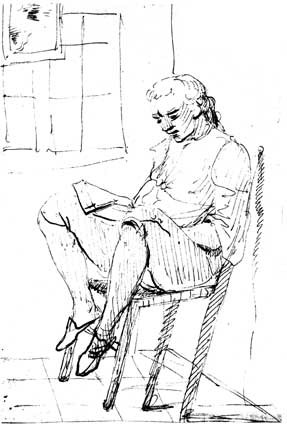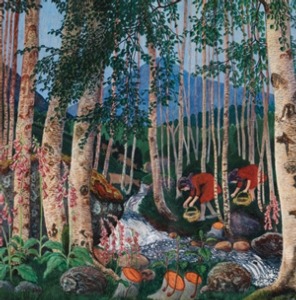A curious thing about Johann Wolfgang Goethe is that so much is known about him from a biographical perspective: the precise details of his daily doings have even been gathered up in an amazing sequence of volumes entitled Goethe Day by Day. In one sense this is entirely appropriate. For Goethe’s whole life and way of living is really his claim to fame, and, more importantly, his claim upon our imagination. He once said that all his work should be read as "fragments of a great confession. That is, of course, partly a plea for generous judgement. But it’s also a good hint to future readers.
 It’s ironic, therefore, that Goethe is best known from an artistic perspective for only two works: The Sorrows of Young Werther, his passionate novel of unrequited love and despairing suicide written when he was in his mid-twenties, and Faust, his much later dramatic study of the tension between ambition and satisfaction. Despite their merits, these two provide an altogether misleading impression of the range of Goethe’s qualities.
It’s ironic, therefore, that Goethe is best known from an artistic perspective for only two works: The Sorrows of Young Werther, his passionate novel of unrequited love and despairing suicide written when he was in his mid-twenties, and Faust, his much later dramatic study of the tension between ambition and satisfaction. Despite their merits, these two provide an altogether misleading impression of the range of Goethe’s qualities.
Those who wish to reach the core of his literary output should rather turn to his long novel chronicling the career of Wilhelm Meister, particularly the first eight volumes which appear under the heading of Wilhelm Meister’s Apprenticeship Years. These began to be published at the beginning of 1794, the moment when Goethe was starting to become intimate with Frederick Schiller, his most important friend and the greatest influence upon his life and work.
At this stage, Goethe was in his forties, and he uses the book to reflect upon the romanticism of Young Werther, to ask, through the character of Wilhelm Meister, what Werther might have done with his life if he had not killed himself in romantic despair. It is, therefore, a story of how an individual develops through error, confusion and periods of despair, as well through bits of good luck, intelligence, ambition and friendship, towards some kind of functioning maturity. Goethe always allows that Wilhelm, like others, can at different times operate with rather different conceptions of himself and his life.
It’s this obsession with development and personal growth which is fundamental to any understanding of Goethe. But he didn’t at all have a linear, progressive or typically Enlightenment vision of progress. Indeed in his younger days he was connected with an intellectual and social movement called “Sturm und Drang” which was an attempt to break out of what was seen as both the unduly narrow confines of prudent practicality and the Enlightenment vision of reasonableness.
But when Goethe outgrew this phase of romantic rebellion, what stayed with him was an awareness of the process of development that such a move involved. Wilhelm Meister once complains to an older man who had been, from a distance, observing Wilhelm’s own follies and errors. “Why didn’t you stop me, why didn’t you intervene to prevent my mistakes?” he asks. The older man argues that in the end, it would have done no good. The lesson being taught is that we have to make errors: the path to development is never a smooth one.
What Goethe did share with the Romantics, and in opposition to the idea of the progress of sweet reasonableness, was a sense that life cannot be neatly ordered: life is, to use a favourite German word of the time, “dumpf” – dull, muffled, resistant to enlightenment and clarification. But there were other ways in which Goethe tried to reject romantic versions of human life.
He was, for example, a great beneficiary of the idea of “genius” which was prevalent throughout his life. This notion was used to throw the weight of admiration upon the creative individual. But as Goethe says this was an indiscriminate concept. It is hard to pin down quite where the creative drive and achievement are to be located in an individual life and the answer is almost always unappealing. Goethe’s productive genius, for example, lay to a very large extent in his capacity for hard work, his willingness to accept (although hardly to enjoy) periods of rejection. But many of his admirers did not want to locate his genius – his creative abililty – in such strenuous and unappetising matters. They preferred a more superficial view of genius, one which could more readily be imitated.
Goethe was much annoyed by this attitude. He saw it, essentially, as a way of dealing with envy – by reducing the envied achievement to a level where its merits were easily copied. After all, it’s not hard to break rules.
A more appealing attitude was later defined by Kant. Genius, he argued in The Critique of Judgement is the capacity to give new rules (or at least new exemplary ways of doing things) to art. In other words, it’s not the breaking of the rules that counts but the forging of a new procedure which then strikes other people as absolutely right. Anyone can do the former. The latter is rare.
The American poet Walt Whitman’s famous line: “Do I contradict myself? Very well, I contradict myself. I am large, I contain multitudes,” beautifully expresses one aspect of Goethe. As his voluminous career shows, he was many sided, complex. But that’s not the full story. During his life he became increasingly devoted to classical ideals of unity and harmony. He wanted his life – his personality – to be coherent. And one reason he wanted this was an appetite for power. It has sometimes distressed Goethe’s admirers that he was involved for so many years in the tasks of government – in the small state of Weimar. But this involvement – which cost him a great deal of anguish – was nevertheless very dear to him and a key to his character. Goethe really wanted to rule other people. He wanted to get things done in the world. This required steady application, clarity of aim, persistence and accommodation of the crooked timbers of humanity. The tension between the demands for unity (and practical efficiency) and for multiplicity (and depth and wonder) was central to Goethe’s character. The tension could never be resolved – and was a great source of his creative energy.
What’s so powerful about Goethe is that his ambition to self-control – to the shaping and ordering of a life – is not founded upon rejection of natural instinct, or embarrassment about the body. In his Venetian Epigrams – his most gloriously dirty poetic sequence – he explains how he would like there to be a religion devoted to masturbation. I’d join, he adds. In fact, I’d be a saint, I’d be the first martyr. Goethe’s goal is not “morality” in any traditional sense: it is making the most of one’s life.
There is, after all, nothing other than this life. Immortality, he thought, was a preoccupation of idle people. “A competent man with something sensible to do down here – who has to work hard every day to accomplish it – he lets the future world take care of itself.”
Since this world is the only world we can live in, we have to make the best of it. What’s the value of being discontented? Not that Goethe ever suggested we should become like him. We should rather take courage in an infinitely more worthwhile task – that of becoming ourselves. ■
John Armstrong
is a reader in the Philosophy of Art at Melbourne University. This article is based on his latest book, Love, Life, Goethe (Penguin).

